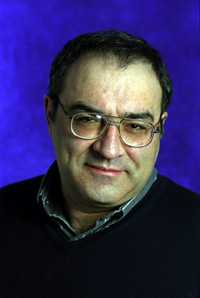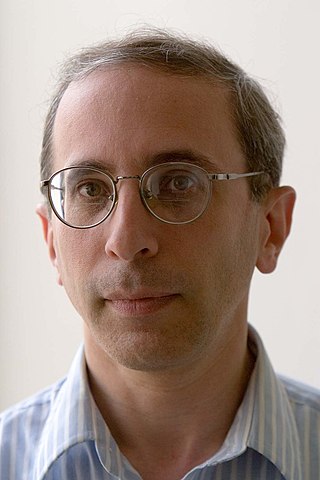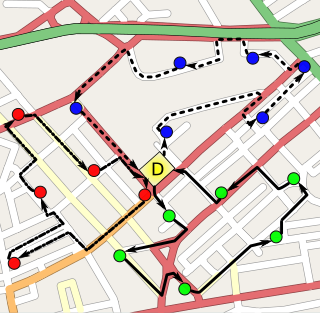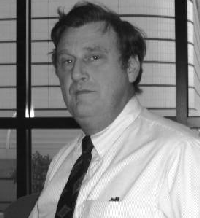
Stephen Arthur Cook is an American-Canadian computer scientist and mathematician who has made significant contributions to the fields of complexity theory and proof complexity. He is a university professor emeritus at the University of Toronto, Department of Computer Science and Department of Mathematics.

Peter Williston Shor is an American mathematician known for his work on quantum computation, in particular for devising Shor's algorithm, a quantum algorithm for factoring exponentially faster than the best currently-known algorithm running on a classical computer. He has been a professor of applied mathematics at the Massachusetts Institute of Technology (MIT) since 2003.

Wolfgang Haken was a German American mathematician who specialized in topology, in particular 3-manifolds.

Leonid Genrikhovich Khachiyan was a Soviet and American mathematician and computer scientist.

Martin David Davis was an American mathematician and computer scientist who contributed to the fields of computability theory and mathematical logic. His work on Hilbert's tenth problem led to the MRDP theorem. He also advanced the Post–Turing model and co-developed the Davis–Putnam–Logemann–Loveland (DPLL) algorithm, which is foundational for Boolean satisfiability solvers.

László "Laci" Babai is a Hungarian professor of computer science and mathematics at the University of Chicago. His research focuses on computational complexity theory, algorithms, combinatorics, and finite groups, with an emphasis on the interactions between these fields.

Avi Wigderson is an Israeli computer scientist and mathematician. He is the Herbert H. Maass Professor in the school of mathematics at the Institute for Advanced Study in Princeton, New Jersey, United States of America. His research interests include complexity theory, parallel algorithms, graph theory, cryptography, and distributed computing. Wigderson received the Abel Prize in 2021 for his work in theoretical computer science. He also received the 2023 Turing Award for his contributions to the understanding of randomness in the theory of computation.
Marek Chrobak is a full professor at University of California, Riverside. He is known for his work competitive analysis of online algorithms, particularly for the k-server problem, on information dissemination in ad-hoc radio networks, and on graph drawing.

Daniel S. Hirschberg is a full professor in Computer Science at University of California, Irvine. His research interests are in the theory of design and analysis of algorithms.
Andrew Zisserman is a British computer scientist and a professor at the University of Oxford, and a researcher in computer vision. As of 2014 he is affiliated with DeepMind.
Daniel Alan Spielman has been a professor of applied mathematics and computer science at Yale University since 2006. As of 2018, he is the Sterling Professor of Computer Science at Yale. He is also the Co-Director of the Yale Institute for Network Science, since its founding, and chair of the newly established Department of Statistics and Data Science.
Alistair Sinclair is a British computer scientist and computational theorist.

Applied mathematics is the application of mathematical methods by different fields such as physics, engineering, medicine, biology, finance, business, computer science, and industry. Thus, applied mathematics is a combination of mathematical science and specialized knowledge. The term "applied mathematics" also describes the professional specialty in which mathematicians work on practical problems by formulating and studying mathematical models.
Nathan (Nati) Linial is an Israeli mathematician and computer scientist, a professor in the Rachel and Selim Benin School of Computer Science and Engineering at the Hebrew University of Jerusalem, and an ISI highly cited researcher.
Amos Fiat is an Israeli computer scientist, a professor of computer science at Tel Aviv University. He is known for his work in cryptography, online algorithms, and algorithmic game theory.

Anatol Slissenko is a Soviet, Russian and French mathematician and computer scientist. Among his research interests one finds automatic theorem proving, recursive analysis, computational complexity, algorithmics, graph grammars, verification, computer algebra, entropy and probabilistic models related to computer science.

Thomas Lengauer is a German computer scientist and computational biologist.

Virginia Vassilevska Williams is a theoretical computer scientist and mathematician known for her research in computational complexity theory and algorithms. She is currently the Steven and Renee Finn Career Development Associate Professor of Electrical Engineering and Computer Science at the Massachusetts Institute of Technology. She is notable for her breakthrough results in fast matrix multiplication, for her work on dynamic algorithms, and for helping to develop the field of fine-grained complexity.
Komei Fukuda is a Japanese mathematician known for his contributions to optimization, polyhedral computation and oriented matroid theory. Fukuda is a professor in optimization and computational geometry in the Department of Mathematics and in the Institute of Theoretical Computer Science at ETH Zurich.
Jin-Yi Cai is a Chinese American mathematician and computer scientist. He is a professor of computer science, and also the Steenbock Professor of Mathematical Sciences at the University of Wisconsin–Madison. His research is in theoretical computer science, especially computational complexity theory. In recent years he has concentrated on the classification of computational counting problems, especially counting graph homomorphisms, counting constraint satisfaction problems, and Holant problems as related to holographic algorithms.












